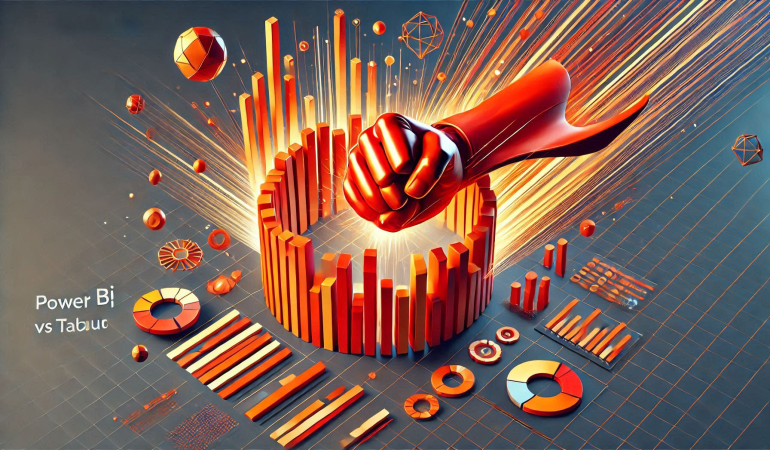
Power BI vs Tableau: Which is Best for Data Analysis?
Dec 13, 2024
Power BI vs Tableau: Which is Best for Data Analysis?
Data analysis is essential for making data-driven business decisions. Among the top tools for this purpose, Power BI and Tableau are industry leaders. This article explores these two platforms, comparing features, pricing, performance, and usability to help you decide which is best for your data analysis needs.
Overview of Power BI
Power BI is a business analytics tool by Microsoft, designed to provide interactive data visualizations and business intelligence capabilities.
Key Features of Power BI
- Data Visualization: Pre-built dashboards and customizable reports.
- Data Connectivity: Connects to hundreds of data sources.
- Integration: Works seamlessly with Microsoft products like Excel, Azure, and Teams.
Pricing for Power BI
- Power BI Free: Limited to individual users.
- Power BI Pro: $13.99 per user/month for advanced features.
- Power BI Premium: Enterprise-level with enhanced capacity and features.
Use Cases
- Business performance monitoring
- Sales and marketing analysis
- Financial reporting
Overview of Tableau
Tableau is a leading data visualization tool known for its robust analytics capabilities and intuitive interface.
Key Features of Tableau
- Visual Analytics: Advanced visualizations with drag-and-drop functionality.
- Data Connectivity: Connects to various databases, cloud services, and files.
- AI Integration: Includes AI-powered data insights.
Pricing for Tableau
- Tableau Public: Free, limited version.
- Tableau Creator: $70 per user/month.
- Tableau Explorer and Viewer: Scalable pricing for teams and organizations.
Use Cases
- Data visualization for analysts
- Market trend analysis
- Financial forecasting
Comparing Power BI and Tableau
Ease of Use
- Power BI: Easier for beginners with Microsoft familiarity.
- Tableau: Better for advanced analysts due to complex features.
Data Connectivity
- Power BI: Strong integration with Microsoft products.
- Tableau: More flexible, connecting to a wider range of data sources.
Data Visualization Capabilities
- Power BI: Great for standard business reports and dashboards.
- Tableau: Superior visual customization and interactive dashboards.
Performance and Speed
- Power BI: Performs well with smaller datasets.
- Tableau: More efficient with larger datasets and complex calculations.
Pricing Models
- Power BI: More affordable for small and mid-sized businesses.
- Tableau: Higher price, but greater scalability for enterprise use.
Security and Governance
- Power BI: Backed by Microsoft's enterprise-grade security.
- Tableau: Compliant with multiple global security standards.
Collaboration and Sharing
- Power BI: Integrated sharing via Microsoft Teams and SharePoint.
- Tableau: Secure collaboration through Tableau Server and Online.
Strengths of Power BI
- Affordable Pricing: Cost-effective for SMBs.
- Microsoft Integration: Works seamlessly within the Microsoft ecosystem.
- Ease of Use: Ideal for non-technical users.
Strengths of Tableau
- Advanced Visualizations: Custom and interactive data views.
- Data Integration Flexibility: Supports various data sources.
- Data Analytics Features: Advanced analytics and predictive capabilities.
Limitations of Power BI
- Limited Custom Visuals: Less flexibility in custom visualization.
- Performance: Slower with very large datasets.
- Complex Licensing: Can be confusing for enterprises.
Limitations of Tableau
- Pricing: Expensive for small businesses.
- Learning Curve: Requires training for non-technical users.
- Data Preparation: Less robust than some competitors.
Use Cases Comparison
| Use Case | Power BI | Tableau |
|---|---|---|
| Sales & Marketing | Sales performance tracking | Marketing trend analysis |
| Finance | Budget and forecasting reports | Financial scenario modeling |
| Healthcare | Patient data management | Clinical research analytics |
| Education | Student performance dashboards | Research data visualization |
Which Tool Is Best for You?
Choose Power BI if:
- You need an affordable, easy-to-use tool with strong Microsoft integration.
- Your organization has a tight budget but requires powerful reporting.
Choose Tableau if:
- Your focus is on advanced analytics and highly customized dashboards.
- You need a tool that handles large and complex datasets efficiently.
Conclusion
Both Power BI and Tableau are powerful tools for data analysis, catering to different business needs. Choosing the right one depends on your specific use case, budget, and level of technical expertise.
FAQs
1. Is Power BI better than Tableau?
Power BI is better for businesses seeking affordable and user-friendly analytics, while Tableau excels in advanced data visualizations.
2. Can Power BI handle big data?
Yes, but Tableau typically performs better with large datasets.
3. Which is cheaper, Power BI or Tableau?
Power BI is more cost-effective, especially for small and mid-sized businesses.
4. Is Tableau difficult to learn?
It can be challenging for beginners due to its advanced features, but training can help.
5. Can Power BI and Tableau integrate with other tools?
Yes, both integrate with various data sources and business applications.
6. Which tool offers better visual customization?
Tableau offers more advanced customization options for data visualizations.
For more detailed guidance and in-depth training, visit our training here.

